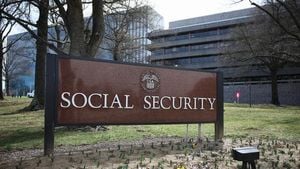Recent revelations have cast a harsh spotlight on modern slavery practices within the UK, particularly highlighting the dark underbelly of fast-food giants like McDonald's. A shocking BBC expose has brought to light the grim experiences of at least sixteen individuals who were effectively enslaved by organized crime elements, working at McDonald's restaurants and other establishments linked to major supermarket chains. With stories of devastating exploitation, the investigation shows how vulnerable individuals, often from precarious backgrounds, fell victim to promises of employment and financial gain.
The victims of this Czech criminal gang endured years of servitude, driven primarily by desperation and the allure of monetary compensation. Many were homeless or struggling with substance abuse, making them easy targets for manipulation. According to reports, these individuals earned meager wages—some as low as a few pounds per day—while the profits they generated supported the lavish lifestyles of their captors back home, which included luxury cars and affluent residences.
During the span of seven years, the operators of this gang crafted elaborate ruses to ensnare their victims. They filled out job applications on behalf of individuals who often struggled with English, and even attended the interviews to act as interpreters. This kind of coercive behavior not only highlights the systemic flaws allowing such exploitation to flourish but also indicates significant oversights on the part of major employers like McDonald's. For at least four years, McDonald’s failed to recognize multiple warning signs of modern slavery within its own ranks. Payments were funneled to foreign bank accounts under suspicious circumstances, and evidence suggested many employees shared the same address—a clear indication of manipulated housing arrangements.
Police sergeant Chris Accourt, who led the investigation against this gang, lamented the missed opportunities to apprehend traffickers earlier and prevent the suffering of the victims. He noted the “huge opportunities” lost to identify these signs, which could have led to timely intervention. It raises pressing questions about the effectiveness of mechanisms meant to protect vulnerable workers within high-profile corporations and industries.
Adding weight to these concerns is the response from former British Prime Minister Theresa May, who now chairs the Global Commission on Modern Slavery and Human Trafficking. May described the situation as "frankly shocking," emphasizing the failure of corporations to properly examine their supply chains for signs of exploitative practices. This call for accountability resonates even louder considering the influential position of such companies and their capacity to drive ethical business practices across sectors.
Observations from the investigation detail not just the violations of law but are also deeply rooted societal issues. For many of the victims, the pathway to freedom was paved with deceit and hardship. While some managed to escape their captors temporarily, they were often recaptured, highlighting the pervasive control exerted by the criminals. The psychological toll on these individuals is likely immeasurable, as they navigate experiences rooted deeply within vulnerability and exploitation.
The combination of low pay, grueling hours—reportedly between seventy and one hundred hours each week—and appalling living conditions paints a grim picture of this contemporary form of slavery. It creates an urgent need for widespread reform within the franchise systems and their operational standards. With one victim recounting the horror of enduring thirty-hour shifts, it reveals shocking truths about labor rights and protections failing to shield those who need it most.
McDonald's, reacting to these findings, has made commitments to improve its processes for identifying modern slavery, but concerns remain about the practical implementation of these measures and whether they extend to all the suppliers involved. According to compliance training experts from Skillcast, businesses need to prioritize visibility within their supply chains, as well as proper due diligence when selecting suppliers. They advocate for proactive measures and awareness of the indicators of modern slavery.
Skillcast’s CEO Vivek Dodd emphasizes the need for businesses to implement rigorous questioning for suppliers. Questions like “What does your supply chain look like?” and “What measures are you implementing to mitigate modern slavery risks?” are pivotal to fostering transparency. Only through questioning and engaging suppliers can companies begin to build ethical standards and mitigate risks concerning exploitation.
Under the Modern Slavery Act of 2015, consultative measures exist, requiring companies with annual turnovers exceeding £36 million to disclose their strategies on slavery within their supply chains. The law aims to pressure companies to recognize and eradicate such practices; still, the effectiveness largely hinges on the awareness and commitment of business owners and leaders.
Some indicators of modern slavery include physical signs of abuse, restricted movement of workers, and poor living conditions—all glimpses of how insidious these practices are. Violated individuals may often exhibit demeanor changes such as fearfulness, withdrawal, and even the absence of personal identification, signaling someone else's control over their rights and freedoms. Recognizing these indicators is absolutely pivotal to early intervention, especially for establishments like McDonald's, where large workforces mean higher risks for exploitation.
Beyond policy and law, tackling these issues requires cultural change. There is also the call for collective responsibility across industries—businesses need to recognize their role within the wider society and be held accountable for their operational practices. Encouragingly, the conversation around the ethics of labor supply chains is gaining momentum; it inspires hope for future reform and the eventual amelioration of these horrific practices.
The trial of the Czech gang members, which began belatedly due to the pandemic, emphasizes the urgent need for increased vigilance. The handling of these cases has underscored gaps not only within law enforcement but also within the corporate frameworks unable or unwilling to confront uncomfortable truths.
With this wave of evidence and advocacy, the hope remains tangible. Calls for accountability have never sounded louder. For those operating within the corridors of power and influence, recognizing and managing modern slavery risks are no longer mere practices—they are moral imperatives. It is through unity, vigilance, and rigorous scrutiny of labor practices and supply chains, paired with public awareness and legislative power, where change can flourish and exploitation can be dismantled.



